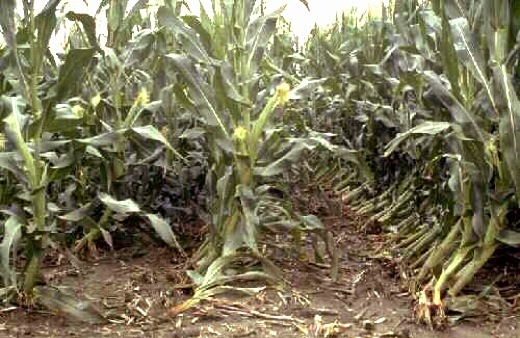SUBHEAD: Whatever is the cause, it is generating a lot of concern. At this point it’s not just an isolated field here or there.
By Jack Kaskey on 2 September 2011 for Bloomberg News -
(http://www.bloomberg.com/news/2011-09-02/monsanto-corn-is-showing-illinois-insect-damage-as-investigation-widens.html)

Image above: Ohio State University photo of corn rows damaged by rootworms. From (http://ohioline.osu.edu/icm-fact/images/40.html).
Monsanto’s insect-killing corn is falling over in northwestern Illinois fields, a sign that rootworms outside of Iowa may have developed resistance to the genetically modified crop, according to one scientist.
Michael Gray, an agricultural entomologist at the University of Illinois in Urbana, said he’s studying whether western corn rootworms collected last month in Henry and Whiteside counties are resistant to an insect-killing protein derived from Bacillus thuringiensis, or Bt, a natural insecticide engineered into Monsanto corn.
The insects were collected in two fields where corn had toppled after roots were eaten by rootworms, Gray said today. Planting Bt corn year after year increases the odds that the bugs will develop resistance to the insecticide, he said. While the symptoms parallel bug resistance that’s been confirmed in Iowa, analysis of the Illinois insects won’t be complete until next year, he said.
“Whatever is the cause, it is generating a lot of concern.” Gray said in a telephone interview. “I wouldn’t say at this point it’s just an isolated field here or there.”
Monsanto takes reports like Gray’s “seriously” and follows up on all accounts of unexpected damage and other performance questions, said Lee Quarles, a spokesman for the St. Louis-based company. Monsanto’s monitoring hasn’t found rootworm resistance to its Bt corn and the product is performing well on more than 99 percent of acres planted, he said.
Preliminary Findings
Monsanto dropped $3.02, or 4.4 percent, to $65.91 as of 2:24 p.m. in New York Stock Exchange composite trading. The shares fell 1 percent this year through yesterday.
Gray detailed his preliminary findings last week in the university’s Pest Management and Crop Development Bulletin. He said he’s since been contacted by more farmers whose Bt corn is succumbing to corn rootworms.
“It’s very, very significant damage,” Gray said. “Producers buy these Bt hybrids to protect their root systems, so it understandably makes them not very happy.”
In July, Iowa State University entomologist Aaron Gassmann reported the first rootworms confirmed as being Bt-resistant, which he found in four of the state’s cornfields.
Gray advised growers with performance problems to rotate corn crops with soybeans and to plant corn with a different type of Bt technology.
Monsanto’s SmartStax corn introduced last year is engineered to produce a second Bt insecticide that, when used with crop rotation and a refuge of non-Bt corn, will extend the usefulness of the insect-fighting technology, Quarles said.
.
By Jack Kaskey on 2 September 2011 for Bloomberg News -
(http://www.bloomberg.com/news/2011-09-02/monsanto-corn-is-showing-illinois-insect-damage-as-investigation-widens.html)

Image above: Ohio State University photo of corn rows damaged by rootworms. From (http://ohioline.osu.edu/icm-fact/images/40.html).
Monsanto’s insect-killing corn is falling over in northwestern Illinois fields, a sign that rootworms outside of Iowa may have developed resistance to the genetically modified crop, according to one scientist.
Michael Gray, an agricultural entomologist at the University of Illinois in Urbana, said he’s studying whether western corn rootworms collected last month in Henry and Whiteside counties are resistant to an insect-killing protein derived from Bacillus thuringiensis, or Bt, a natural insecticide engineered into Monsanto corn.
The insects were collected in two fields where corn had toppled after roots were eaten by rootworms, Gray said today. Planting Bt corn year after year increases the odds that the bugs will develop resistance to the insecticide, he said. While the symptoms parallel bug resistance that’s been confirmed in Iowa, analysis of the Illinois insects won’t be complete until next year, he said.
“Whatever is the cause, it is generating a lot of concern.” Gray said in a telephone interview. “I wouldn’t say at this point it’s just an isolated field here or there.”
Monsanto takes reports like Gray’s “seriously” and follows up on all accounts of unexpected damage and other performance questions, said Lee Quarles, a spokesman for the St. Louis-based company. Monsanto’s monitoring hasn’t found rootworm resistance to its Bt corn and the product is performing well on more than 99 percent of acres planted, he said.
Preliminary Findings
Monsanto dropped $3.02, or 4.4 percent, to $65.91 as of 2:24 p.m. in New York Stock Exchange composite trading. The shares fell 1 percent this year through yesterday.
Gray detailed his preliminary findings last week in the university’s Pest Management and Crop Development Bulletin. He said he’s since been contacted by more farmers whose Bt corn is succumbing to corn rootworms.
“It’s very, very significant damage,” Gray said. “Producers buy these Bt hybrids to protect their root systems, so it understandably makes them not very happy.”
In July, Iowa State University entomologist Aaron Gassmann reported the first rootworms confirmed as being Bt-resistant, which he found in four of the state’s cornfields.
Gray advised growers with performance problems to rotate corn crops with soybeans and to plant corn with a different type of Bt technology.
Monsanto’s SmartStax corn introduced last year is engineered to produce a second Bt insecticide that, when used with crop rotation and a refuge of non-Bt corn, will extend the usefulness of the insect-fighting technology, Quarles said.
.
No comments :
Post a Comment